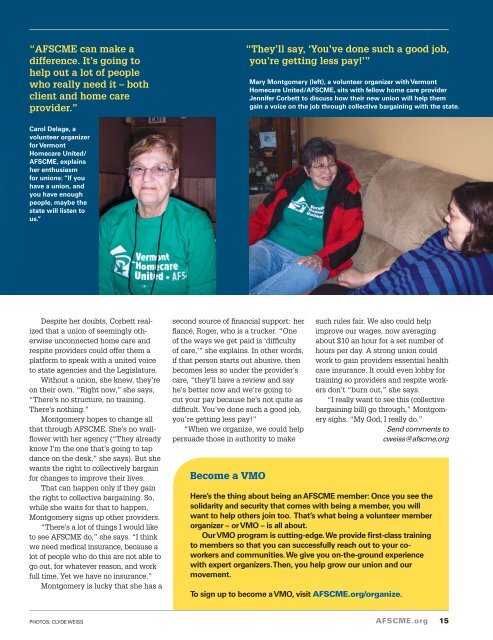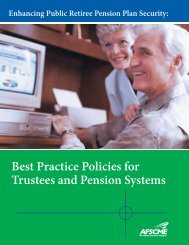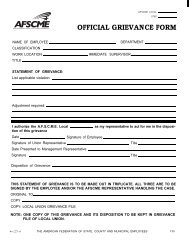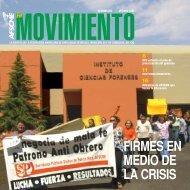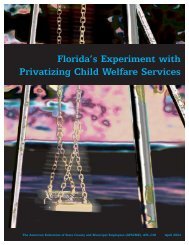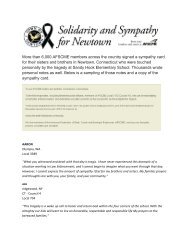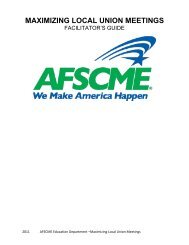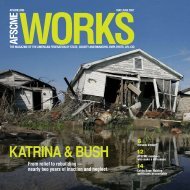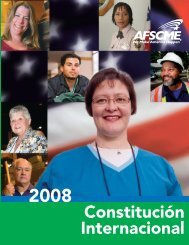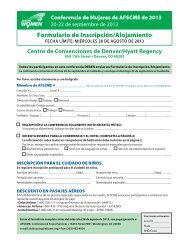Download this publication as a PDF - AFSCME
Download this publication as a PDF - AFSCME
Download this publication as a PDF - AFSCME
You also want an ePaper? Increase the reach of your titles
YUMPU automatically turns print PDFs into web optimized ePapers that Google loves.
“<strong>AFSCME</strong> can make adifference. It’s going tohelp out a lot of peoplewho really need it – bothclient and home careprovider.”“They’ll say, ‘You’ve done such a good job,you’re getting less pay!’”Mary Montgomery (left), a volunteer organizer with VermontHomecare United/<strong>AFSCME</strong>, sits with fellow home care providerJennifer Corbett to discuss how their new union will help themgain a voice on the job through collective bargaining with the state.Carol Delage, avolunteer organizerfor VermontHomecare United/<strong>AFSCME</strong>, explainsher enthusi<strong>as</strong>mfor unions: “If youhave a union, andyou have enoughpeople, maybe thestate will listen tous.”Despite her doubts, Corbett realizedthat a union of seemingly otherwiseunconnected home care andrespite providers could offer them aplatform to speak with a united voiceto state agencies and the Legislature.Without a union, she knew, they’reon their own. “Right now,” she says,“There’s no structure, no training.There’s nothing.”Montgomery hopes to change allthat through <strong>AFSCME</strong>. She’s no wallflowerwith her agency (“They alreadyknow I’m the one that’s going to tapdance on the desk,” she says). But shewants the right to collectively bargainfor changes to improve their lives.That can happen only if they gainthe right to collective bargaining. So,while she waits for that to happen,Montgomery signs up other providers.“There’s a lot of things I would liketo see <strong>AFSCME</strong> do,” she says. “I thinkwe need medical insurance, because alot of people who do <strong>this</strong> are not able togo out, for whatever re<strong>as</strong>on, and workfull time. Yet we have no insurance.”Montgomery is lucky that she h<strong>as</strong> <strong>as</strong>econd source of financial support: herfiancé, Roger, who is a trucker. “Oneof the ways we get paid is ‘difficultyof care,’” she explains. In other words,if that person starts out abusive, thenbecomes less so under the provider’scare, “they’ll have a review and sayhe’s better now and we’re going tocut your pay because he’s not quite <strong>as</strong>difficult. You’ve done such a good job,you’re getting less pay!”“When we organize, we could helppersuade those in authority to makeBecome a VMOsuch rules fair. We also could helpimprove our wages, now averagingabout $10 an hour for a set number ofhours per day. A strong union couldwork to gain providers essential healthcare insurance. It could even lobby fortraining so providers and respite workersd on’t “burn out,” she says.“I really want to see <strong>this</strong> (collectivebargaining bill) go through,” Montgomerysighs. “My God, I really do.”Send comments tocweiss@afscme.orgHere’s the thing about being an <strong>AFSCME</strong> member: Once you see thesolidarity and security that comes with being a member, you willwant to help others join too. That’s what being a volunteer memberorganizer – or VMO – is all about.Our VMO program is cutting-edge. We provide first-cl<strong>as</strong>s trainingto members so that you can successfully reach out to your coworkersand communities. We give you on-the-ground experiencewith expert organizers. Then, you help grow our union and ourmovement.To sign up to become a VMO, visit <strong>AFSCME</strong>.org/organize.PHOTO: PHOTOS: CLYDE WEISS<strong>AFSCME</strong>.org 15


